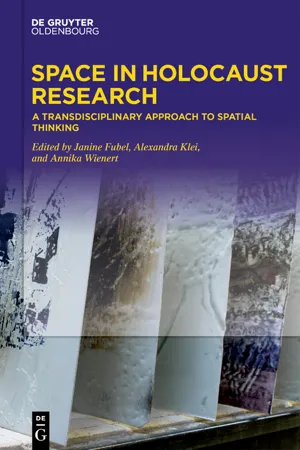
Space in Holocaust Research
A Transdisciplinary Approach to Spatial Thinking
- 362 pages
- English
- ePUB (mobile friendly)
- Available on iOS & Android
Space in Holocaust Research
A Transdisciplinary Approach to Spatial Thinking
About this book
In recent years, the issue of space has sparked debates in the field of Holocaust Studies. The book demonstrates the transdisciplinary potential of space-related approaches. The editors suggest that "spatial thinking" can foster a dialogue on the history, aftermath, and memory of the Holocaust that transcends disciplinary boundaries. Artworks by Yael Atzmony serve as a prologue to the volume, inviting us to reflect on the complicated relation of the actual crime site of the Sobibor extermination camp to (family) memory, archival sources, and material traces.
In the first part of the book, renowned scholars introduce readers to the relevance of space for key aspects of Holocaust Studies. In the second part, nine original case studies demonstrate how and to what ends spatial thinking in Holocaust research can be put into practice. In four introductory essays, the editors identify spatial configurations that transcend conventional disciplinary, chronological, or geographical systematizations: Fleeting Spaces; Institutionalized Spaces; Border/ing Spaces; Spatial Relations. Drawing on a host of theoretical concepts and addressing various historical contexts as well as different types of media, this book offers scholars and students valuable insights into cutting-edge, international scholarly debates.
Frequently asked questions
- Essential is ideal for learners and professionals who enjoy exploring a wide range of subjects. Access the Essential Library with 800,000+ trusted titles and best-sellers across business, personal growth, and the humanities. Includes unlimited reading time and Standard Read Aloud voice.
- Complete: Perfect for advanced learners and researchers needing full, unrestricted access. Unlock 1.4M+ books across hundreds of subjects, including academic and specialized titles. The Complete Plan also includes advanced features like Premium Read Aloud and Research Assistant.
Please note we cannot support devices running on iOS 13 and Android 7 or earlier. Learn more about using the app.
Information
Table of contents
- Title Page
- Copyright
- Contents
- Tracing Oblivion: The Collected Works of Yael Atzmony
- Tracing Oblivion
- Spatial Thinking in Holocaust Studies
- Part I: Theoretical-methodological Approaches
- Part II: Case Studies Fleeting Spaces
- Institutionalized Spaces
- Border/ing Spaces
- Spatial Relations